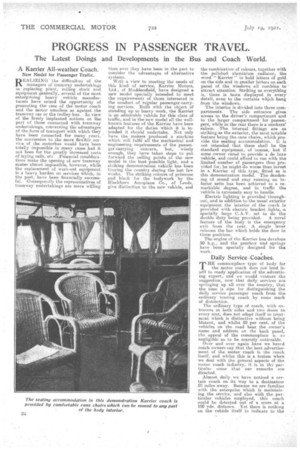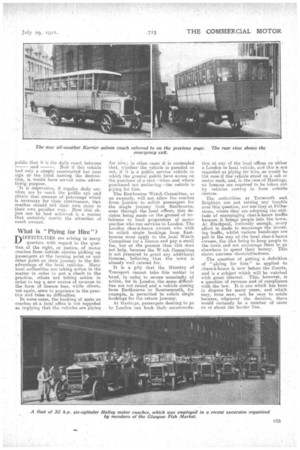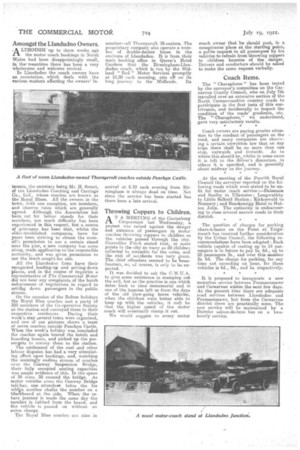PROGRESS IN PASSENGER TRAVEL.
Page 20

Page 21

Page 22

If you've noticed an error in this article please click here to report it so we can fix it.
The Latest Doings and Developments in the Bus and Coach World.
A Karrier All-weather Coach.
New Model for Passenger Traffic.
REAL1ZINGr' the difficulties of the managers of tramway undertakings in replacing plant, rolling stock and equipment.generally, several of the most enterprising heavy vehicle manufacturers have seized the opportunity of presenting the case of the motor coach and the motor omnibus as against the tramway car or the trolley-bus. In view of the firmly implanted notions on the part of those connected with tramway undertakings concerning the advantages of the form of transport with which they have been connected for many years, the conversion to the more flexible service of the motorbus would have been totally impossible in many cases had it not been for the greatly increased costs of laying rails, etc Financial considerations make the opening of new tramway routes almost impossible, however, while the replacement of worn-out equipment is a heavy burden on services Which, in the past, have been financially successful. Consequently the representatives of tramway undertakings are more willing
than ever they have been in the past to consider the advantages of alterrustiye systems.
With a view to meeting the needs of this kind of service, Karrier Motors, Ltd., of Huddersfield, have designed a new model specially intended to meetthe requirements of those interested in the conduct of 'regular passenger-carrying services. Built with the object of standing up to heavy work, the }Carrier is an admirable vehicle for this class of traffic, and in the new model all the wellknown features of the Karrier have been adapted for the duties which it is intended it should undertake. Not only have the makers produced a machine which will fulfil all the mechanical and engineering requirements of the passenger-carrying concern, but, wisely enough, they have taken steps to put forward the selling points of the new model in the best possible light, and a striking demonstration vehicle has been touring the country during the last few ineks. The striking colours of primrose and black for the bodywork by the Blackburn Aeroplane Co., of Leeds, give distinction to the new vehicle, and
the combination of colours, together with the polished aluminium radiator, the word " Karrier " in bold letters of gold on the side and in smaller letters on each panel of the windows all combine to attract attention. Striking as everything
• is, there is taste displayed in every detail, even to the curtains which hang from the windows.
The interior is divided into three compartments. The side entrance gives access to the driver's compartment and to the larger compartment for passengers, while in the rear there is a smokers' saloon. The internal fittings are as .striking as the exterior, the most notable feature being the cane chairs, which provide the seating accommodation. It is not intended that these shall be the standard equipment, of -course, but if some owner cared to provide a de luxe vehicle, and could afford to run with the limited number of passengers thus provided for, he might do worse than invest in a Karrier of this type, fitted as is this demonstration model. The deadening of sound and easy running on inferior setts has been achieved to a remarkable degree, and in traffic the vehicle is extremely easy to handle,
Electric lighting is provided throughout, and in addition to the usual exterior equipment the interior of the coach is provided with electric bracket lights, a specially large C.A.V. set to do the double duty being 'provided. A novel feature of the body is the emergency exit from the rear. A single lever releases the bar which holds the door in three positions. The engine of the Karrier bus develops 50 h.p., and the gearbox and springs have been specially designed for the work.
Daily Service-Coaches.
T_ commonplace commonplace type of body for the motor coach does not lend itself to ready application of the advertising expert,. and we would venture tha suggestion, now that daily. services are springing up all over the country, that the time is ripe for distinguishing the daily service passenger coach from the ordinary touring coach by some mark of distinction.
The ordinary type of coach, with entrances at both sides and two doors to every seat, does not adapt itself to treatment which is distinctive without being blatant, and whilst 99 per cent, of the vehicles on the road bear the owner's mime and address on the back panel, the appeal of the commonplace is SO negligible as to be scarcely noticeable.
Over and over again have we heard coach owners say that the best advertise: merit of the motor coach is the coach itself, mid whilst this is a truism when we deal with the general aspeets of the motor coach industry, it is in this particular sense that our remarks are directed.
Almost daily we have noticed a certain coach on its way to a destination 50 miles away. Because we are familiar with the. enterprise which is maintaining the service, and also with the particular vehicles employed, this coach could be detected out of a score at a 100 yds. distance. Yet there is nothing on the vehicle itself to indicate to the public that it. is the daily coach botween and . Now if this vehicle had only a simply constructed but neatsign at the front .naming the destination, it would have -served some advertising purpose. 'It is inoperative, if regular daily services are to catch the public eye and obtain that .amount of. patronage which is necessary for their continuance, that coaches should tell their own story in their own peculiar nay. How this object can be best achieved is a matter that certainly merits the attention of coach owners.
What is "Plying for Hire " ?
DIFFICULTIES are arising in many quarters with regard to the question of the right, or justice, of motor coaches from outside centres picking up passengers at the turning point or any other point on their journey to the disadvantage of the local vehlcles. Many local authorities are taking action in the matter in order to put a check to the practice, others are taking action in order to tap a new -source of revenue in the form of licence fees, while others, vet again, seem to -acquiesce in the practice and raise nodifficulties.
In some cases, the booking of seats on :coaches at a local office is not regarded as implying that the vehicles, are plying
for hire ; in other cases it is contended that-, whether the vehicle is paraded or not, if it is a 'public service vehicle to . which the general public have access on
the. purchase Of as e a t h en and where purchased not mattering—the vehicle is plying for hire, The Eastbourne Watch Committee, as an example, will not allow the coaches from. London to solicit passengers for the single journey from Eastbourne, even through the local offices, this decision being made on the -ground of unfairness to local proprietors of motor coaches who run service-s to London. TheLondon ch.:ix-à-banes owners who wish to solicit single bookings from Eastbourne must apply to the local Watch Committee for a licence and pay a small fee, but at the present time this does not help, because the W tch Committee is not prepared to grant any additional licences, believing that the town is
already well catered for. • It is a pity that the Ministry of Transport cannot take this matter in hand, in order to secure unanimity of action, for in London the same difficulties are riot raised and a vehicle coming from Eastbourne br Bournemouth, for example, is permitted' to solicit single bookings for the return: journey.
At Hastings, passengers desiring to go to London can hook-. their accommoda
tion at any of the 'local offices on either a London or local vehicle, and this is not regarded as plying for hire, as would be the case if the vehicle stood on a cab or motor rank, and, in the case of Hastings, no licences are required to be taken out by vehicles coming in from outside centres.
The authorities at Yarmouth and Brighton are not raising any trouble over this question, nor are they at Folks= stone, where they are adopting the attitude of encouraging char-a-banes traffic because it. brings people into the town. At Blackpool, Curiously enough, every effort is made to encourage the incom-, ing traffic, whilst various handicaps are put in the way ofthe local char4-bancs owners, the idea being to keep people in. the town and not encourage them to go elsewhere to spend their money. This shows extreme shortsightedness,
The question of getting a definition of "plying for hire." as applied to chars-a-bancs is pew before the Courts, and is a subject which will be watched with great interest. This, however, is a question of revenue and of compliance with the law. -It is one which has been in dispute for many years, and which may, even now, net be easy to settle because, whatever the decision, there would certainly be a number of eases on or about the border line.
Amongst the Llandudno Owners.
r A LTHOUGBV up to three weeks_ agili ..nr. the motor coach bookings in North Wales had been disappointingly small, in the' meantime there has been a very wholesome and welcome revival. In Llandudno the coach owners have an association, which deals with the various matters affecting the owners' in -terests' the secretary being Mr. H. Smart, of the Llandudno Coaching and Carriage Co., Ltd.' whose coaches are known as the Royal Blues. All the owners in the town, with one exception' are members, and observe rates which are generally agreed. Although the Association has been out for better stands for their members, not much difficulty has been experienced in this respect, but a source a grievance has been that, whilst the older-established companies have for years been striving to obtain the council's permission to use a certain stand near the pier, a. new company has come along, Made application to the responsible authority, and was given permission to use the much-sought-for site. All the Llandudno firms have their recognized loading-up and setting-down places, and in the course of inquiries a representative of The Commercial Motor did not hear any complaints of the harsh enforcement of regulations in regard to setting down passengers in the public streets. On the occasion of the Bolton holidays the Royal Blue coaches met a party of 350 members of the Co-operative Society at the station and conveyed them to their respective residences. During their week's stay several-tours were organized, and one of our pictures shows a. team of seven coaches outside Penrhyn Castle. When the week's holiday was concluded the coaches again toured the hotels and boarding houses, •and picked up the passengers to convey them to the station. The settlement of the coal and other labour disputes has had a very etimulate ing effect upon bookings, and; watching the seemingly endless stream of coaches over the Conway Suspension Bridge,' their fully occupied seating capacities was ample evidence of this. In the space of 30 MMS. 32 crossed the bridge. As motor vehicles cross the Conway Bridge toll-bar, one attendant takes the fee whilst another chalks the number on a blackboard at the side. When the return journey is made the Same day the number is rubbed from the board, and the vehicle is passed on without an extra charge.
The Royal Blue coaches are nine in
number—all Thornyeroft 28-seaters. The proprietary company also operate a number of double-decker buses in the environs of Llandudno. It is from their main booking office in Queen's Hotel Gardens that the Birmingham-Llandudno coach, which is run by the Midland " Red" Motor Services promptly at 10.30 each morning, sets off on its long journey to the Midlands. RS arrival at 6.10 each evening from Birmingham is always dead on time. Not since the service has been started has there been a late arrival.
Throwing Coppers to Children.
AT A MEETINGof the Canterbury Corporation last Wednesday, a protest was raised against the danger and nuisance of passengers in motor coaches throwing coppers to children as the vehicles passed through the city. Councillor Firich stated ehat, at some points in the city as many as 50 children collected to scramble for the coins, and the risk of accidents was very great. The chief offenders seemed to be beanfeasters, as, of course., ie only to be expected. It was decided to ask the C.M.U.A. to give some assistance in stamping out the evil, but as the practice is one which dates back to time immemorial and is one of the legacies left us from the days of the old slow-going horse vehicles, when the children were better able to keep up with the vehicles, it in# be that the higher speed of the motor coach Will eventually stamp. it out. We would suggest to every motor coach owner that he should post, in a conspicuous place at the starting point, a polite request to all passengers by his vehicles to refrain from throwing coppers to children because of the danger. 'Drivers and conductors should be asked to make the same request verbally.
Coach Items.
The " Charaphone " has been tested by the surveyor's committee on the Carnarvon County Council, who on July 7th travelled over an extensive section of the North Carharvonshire country roads to participate in the first tests of this contrivance, and incidentally to inspect the condition of the roads' gradients, etc. The • " Charaphone," we understand, gave very satisfactory results.
Coach owners are paying greater attention to the conduct of passengers on the road, and many companies are observing a certain unwritten law that on day trips there shall be no more than one step, outwards and inwards. As to where this should be, whilst in some cases it is left to the driver's discretion, in others it is specified, and is generally about midway on the journey.
At the meeting of the Penrith Rural Council the surveyor reported on the fol. lowing roads which were stated to be unfit for motor_ coach service :—Dalemain and Soulby to Ullswater " • Longwathby to Little Salkeld Station; Kirkoswald to Nunnery; and Brackenrigg Hotel to Hutton John. The authority is endeavourlug to close several narrow roads in their district.
The question of charges for parking chars-is-issues on the Point at Teignmouth has received further consideration by the Urban Council, the following recommendations have been adopted t Each vehicle capable of testing up to 14 passengers is in future to pay le. 6d., up to 25 passengers 2a., and over this number 2s. 6d. The charge for parking, for any time not exceeding an hour, for these vehicles is 6d., 9d., and is. respectively.
It is proposed to inaugurate a new motorbus service between Penmaenmawr and Carnarvon within the next few days. At the present time there are adequate road services between Llandudno and Penmaernnawr, but from the Carnarvon district there are practically none. The new service will be maintained by a Daimler saloon-de-luxe bus on a two. hourly service.
































